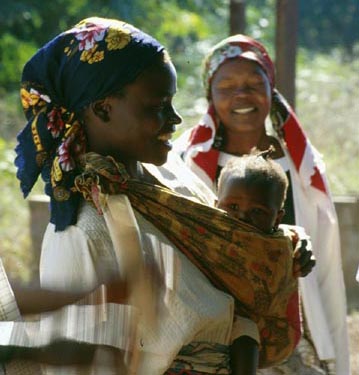
Libya RPCV Cameron Hume was U.S. representative to the peace talks that ended Mozambique's civil war
New U.S. Envoy Named for South Africa is Professional Diplomat
(C. Hume speaks at 10/24 Senate confirmation hearing)
Author: Jim Fisher-Thompson
Date: 20011031
Text:
By Jim Fisher-Thompson Washington File Staff Writer
Washington - When the Senate confirms President George W. Bush's nomination of Ambassador Cameron Hume to be the next U.S. envoy to South Africa, the conflict resolution expert will be the first career diplomat to serve in Pretoria since Princeton Lyman left there six years ago.
Appearing at his Senate Foreign Relations Committee confirmation hearing on October 24, Hume told lawmakers, "During more than thirty years of government service, I have often worked on African affairs." And he added, "I firmly believe that U.S. policy can and must make a difference in Africa."
Hume, the father of four daughters, graduated from Princeton University and holds a law degree from American University. He learned to speak Arabic in order to serve as a political counselor in Damascus and Beirut in the 1980's and was U.S. Ambassador to Algeria from 1997 to 2000. His career has also been spiced with assignments such as vice consul in Palermo and deputy chief of mission to the Holy See (Vatican).
He is currently special adviser to the permanent U.S. Representative to the United Nations.
Hume is also a scholar who once served as director of the Foreign Service Institute's field [language] school in Tunis. He has authored several books on resolving conflicts including: "Ending Mozambique's War," published in 1994 by the U.S. Institute of Peace. A forthcoming book titled: "Mission to Algiers: Diplomacy by Engagement," is based on his experience as U.S. envoy to Algeria.
Former Assistant Secretary of State for African Affairs Herman Cohen, with whom Hume worked on the Mozambique negotiations, told the Washington File, "his role was very crucial. He did an excellent job of helping the mediators who were Italian officials with technical assistance and he also had separate meetings with the both sides in the conflict. His contribution was essential to bringing about the final agreement signed in 1992."
Cohen, himself a former ambassador to Senegal and 30-year career foreign service officer, said "I knew Hume as a very professional, creative diplomat and had a lot of respect for him. So, I'm very pleased that he got this very important job."
At his Senate hearing, the diplomat told Africa Subcommittee Chairman Russell Feingold (Democrat of Wisconsin), "After a tour as a Peace Corps volunteer in Libya, I joined the Foreign Service...and from 1978 to 1980 I worked as the Department's desk officer for South Africa - a tour that introduced me to the challenges and potential of that great country."
Following his duty in South Africa, Hume said he began developing a grounding in conflict resolution -- an expertise that came in handy when he was later assigned to trouble spots. Later, "I was repeatedly involved in U.S. diplomatic efforts to resolve conflicts in Africa," he said, including:
-- Negotiating United Nations resolutions for the mechanisms that led to Namibia's independence;
-- Serving as the U.S. representative to the peace talks that ended Mozambique's civil war;
-- Working with the Algerian government to promote the talks that ended the war between Ethiopia and Eritrea; and
-- As a member of the U.S. delegation to the U.N. working to resolve conflicts in Angola, Burundi, and the Democratic Republic of Congo (DRC).
Senator Feingold made the point that those who think Africa will disappear from the radar screen of U.S. policymakers because of the recent terrorist attacks in the United States that killed thousands, are sorely mistaken. The continent has had its share of horrendous terrorist incidents, he pointed out, including the bombing of U.S. embassies in Kenya and Tanzania in 1998 that killed far more Africans than American, and therefore African help and expertise are essential ingredients in helping the United States mount the offensive against international terrorism.
In that regard, Hume told the Senate Committee, "We have good and improving relations with the South African government in the area of counter-terrorism. I am aware that several South African citizens died in the attack on the World Trade Center, and I want to express my sympathy for their loss."
As for peace and security issues in Africa, Hume told the lawmakers, "South Africa has now deployed peacekeeping troops with the U.N. operation in the Congo, and former President Nelson Mandela is leading the talks aimed at establishing peace in Burundi."
He advised, "It is in our interest to work with the South African government on such regional security issues."
On the economic front, where an "already strong relationship is expanding, in significant part as a result of the African Growth and Opportunity Act (AGOA)," Hume said "we should support their [South African] efforts in such fields as healthcare - including HIV/AIDS and other infectious diseases - educational opportunity, the environment, and assuring respect for the rule of law."
In general, Hume shared an optimistic view of future U.S-South Africa relations pointing out that basically South Africans and Americans "share similar commitments to democracy, to a free market economy, and to seeking a better future for all our citizens. South Africa, by virtue of its human and material potential, has an important leadership role to play, particularly in its immediate region, and throughout Africa.
"It is in our interest to work toward a real partnership with the government and people of South Africa in addressing many of these issues," he concluded.
(The Washington File is a product of the Office of International Information Programs, U.S. Department of State. Web site: http://usinfo.state.gov) NNNN
